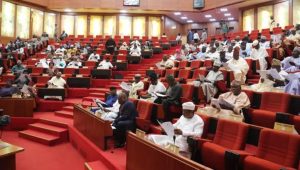The proposed capital punishment also applies to manufacturing, trafficking, dealing in or delivery of hard drugs by any means.
The Senate arrived at the resolution on the floor of the red chamber after deliberations on the National Drug Law Enforcement Agency Act (Amendment) Bill, 2024.
The maximum punishment in the extant law for offenders is life imprisonment.
During the consideration of the report on the bill for passage on Thursday, Senate Whip, Ali Ndume (APC, Borno South), recommended that the punishment of life imprisonment be “toughened” and upgraded to the death penalty.
The penalty for drug importation or dealership is captured in Section 11 of the extant law, which Ndume sought to be increased to a death sentence.
He said, “This (life imprisonment) should be changed to a death sentence. This is the standard worldwide. We have to do this to address this problem of drugs that has seriously affected our youths.
“It should be toughened beyond life imprisonment. It should be the death sentence, either by hanging or any way.”
But this proposal did not sit well with some of his colleagues, including former governor of Edo State, Adams Oshiomhole, who took to the floor to voice out his reservations.
Oshiomhole, who was visibly agitated, told his colleagues that he would rarely joke with any matter concerning life and death.
“When a matter has to do with life and death, we should be accountable. Let’s divide the Senate. This is lawmaking. We are not here to take voice votes,” Oshiomhole said.
His position was, however, overruled by the Deputy Senate President, Barau Jibrin, who presided over the plenary session.
Jibrin told Oshiomhole that he should have called for a division of the Senate immediately after the voting took place and before the Senate moved to another clause in the amendment bill.
“This is about procedure. You were supposed to call for a division; you didn’t do so. I am sorry, I can’t help you,” the DSP said, sanctioning the decision of the Senate.
Similarly, Senator Sampson Ekong from Akwa Ibom State kicked against the resolution of the Senate but he was also overruled.
The Senate went ahead to pass the bill for a third reading.
The report on the bill was jointly produced by the Committees on Judiciary, Human Rights and Legal Matters/Drugs and Narcotics.
Speaking with Senate correspondents after the plenary, the Chairman of the Joint Committee, Mohammed Monguno, said the Senate approved the death sentence, noting that the voices of Oshiomhole and others did not change the ruling of the presiding officer.
“The ruling of the presiding officer is the position of the Senate,” he added.
When contacted over the development, the spokesperson for the NDLEA, Femi Babafemi, said that the anti-narcotics agency could not comment on the matter, being an ongoing legislative business, which had not yet been finalised.
Babafemi said, “The agency cannot comment or be involved in the development because it is a legislative matter.”
Meanwhile, impeccable senior anti-narcotics officers, who spoke to one of our correspondents on the condition of anonymity because they were not authorised to speak on the matter, noted that the House of Representatives and the Senate had yet to harmonise their positions on the amended penalty for drug offenders.
They noted that while the House of Representatives was proposing life sentence for convicted drug offenders, the Senate proposed a death sentence, hence the need to harmonise their positions.
However, one of the sources said, “Though it is not yet a law, the amendment of the NDLEA Act by the National Assembly, proposing life and death sentences for convicted offenders, if made to become a law, would send a strong message to illicit drug traffickers and users.”



